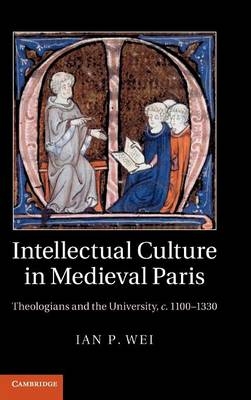
Intellectual Culture in Medieval Paris
Theologians and the University, c.1100–1330
Seiten
2012
Cambridge University Press (Verlag)
978-1-107-00969-1 (ISBN)
Cambridge University Press (Verlag)
978-1-107-00969-1 (ISBN)
This book explores the ideas of theologians at the medieval University of Paris and their attempts to shape society. Investigating their views on money, marriage and sex, Ian Wei reveals the complexity of what theologians had to say about the world around them, and the increasing challenges to their authority.
In the thirteenth century, the University of Paris emerged as a complex community with a distinctive role in society. This book explores the relationship between contexts of learning and the ways of knowing developed within them, focusing on twelfth-century schools and monasteries, as well as the university. By investigating their views on money, marriage and sex, Ian Wei reveals the complexity of what theologians had to say about the world around them. He analyses the theologians' sense of responsibility to the rest of society and the means by which they tried to communicate and assert their authority. In the late thirteenth and early fourteenth centuries, however, their claims to authority were challenged by learned and intellectually sophisticated women and men who were active outside as well as inside the university and who used the vernacular - an important phenomenon in the development of the intellectual culture of medieval Europe.
In the thirteenth century, the University of Paris emerged as a complex community with a distinctive role in society. This book explores the relationship between contexts of learning and the ways of knowing developed within them, focusing on twelfth-century schools and monasteries, as well as the university. By investigating their views on money, marriage and sex, Ian Wei reveals the complexity of what theologians had to say about the world around them. He analyses the theologians' sense of responsibility to the rest of society and the means by which they tried to communicate and assert their authority. In the late thirteenth and early fourteenth centuries, however, their claims to authority were challenged by learned and intellectually sophisticated women and men who were active outside as well as inside the university and who used the vernacular - an important phenomenon in the development of the intellectual culture of medieval Europe.
Ian P. Wei is Senior Lecturer in History at the University of Bristol. His publications include two co-edited volumes, Authority and Community in the Middle Ages (with Don Mowbray and Rhiannon Purdie, 1999) and Medieval Futures: Attitudes to the Future in the Middle Ages (with John Burrow, 2000).
Introduction; 1. The twelfth-century schools of northern France; 2. The twelfth-century monasteries and Hugh of St Victor; 3. The University of Paris in the thirteenth century; 4. Communication and control; 5. Sex and marriage; 6. Money; 7. Anti-intellectual intellectuals in the late thirteenth and early fourteenth centuries: a new context; Bibliography.
| Erscheint lt. Verlag | 3.5.2012 |
|---|---|
| Verlagsort | Cambridge |
| Sprache | englisch |
| Maße | 152 x 229 mm |
| Gewicht | 780 g |
| Themenwelt | Geschichte ► Allgemeine Geschichte ► Mittelalter |
| Geisteswissenschaften ► Geschichte ► Regional- / Ländergeschichte | |
| Geschichte ► Teilgebiete der Geschichte ► Kulturgeschichte | |
| Geisteswissenschaften ► Religion / Theologie ► Christentum | |
| Sozialwissenschaften ► Pädagogik ► Erwachsenenbildung | |
| ISBN-10 | 1-107-00969-3 / 1107009693 |
| ISBN-13 | 978-1-107-00969-1 / 9781107009691 |
| Zustand | Neuware |
| Haben Sie eine Frage zum Produkt? |
Mehr entdecken
aus dem Bereich
aus dem Bereich
eine neue Geschichte des Mittelalters
Buch | Hardcover (2023)
C.H.Beck (Verlag)
CHF 53,20


